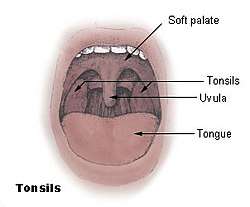扁桃
Chinese
flat; tablet; inscription; small boat |
peach | ||
|---|---|---|---|
| simp. and trad. (扁桃) |
扁 | 桃 | |
| variant forms | 偏桃 匾桃 | ||
Etymology
A Central Asian import during the Medieval period. Perhaps a phono-semantic matching of Persian بادام (bâdâm, “almond”) (as per Cihai), semantically construed as the “flat peach”.
Pronunciation
Japanese

扁桃 (hentō): the tonsils.
| Kanji in this term | |
|---|---|
| 扁 | 桃 |
| へん Hyōgaiji |
とう Grade: S |
| on’yomi | |
Etymology
/pentau/ → /fentau/ → /hentau/ → /hentɔː/ → /hentoː/
From Middle Chinese compound 扁桃 (penX daw, literally “flat, thin + peach”), from the way the almond fruit resembles a flat, thin peach.
The modern sense of tonsil came about by contraction from the full term 扁桃腺 (hentōsen, literally “almond gland”).
Derived terms
Derived terms
- 苦扁桃 (kuhentō): bitter almond
- 苦扁桃油 (kuhentōyu): bitter almond oil
- 苦扁桃水 (kuhentōsui): bitter almond oil dissolved in water
- 扁桃炎 (hentōen): tonsillitis
- 扁桃核 (hentōkaku): amygdala
- 扁桃腺 (hentōsen): tonsil
- 扁桃腺炎 (hentōsen'en): tonsillitis
- 扁桃腺切除 (hentōsen setsujo): tonsillectomy
- 扁桃肥大 (hentō hidai): enlarged tonsils, tonsillar hypertrophy
- 扁桃体 (hentōtai): amygdala
- 扁桃油 (hentōyu): almond oil
References
- 1988, 国語大辞典(新装版) (Kokugo Dai Jiten, Revised Edition) (in Japanese), Tōkyō: Shogakukan
This article is issued from
Wiktionary.
The text is licensed under Creative
Commons - Attribution - Sharealike.
Additional terms may apply for the media files.